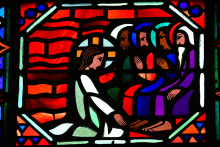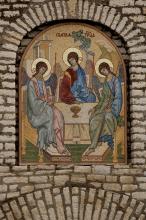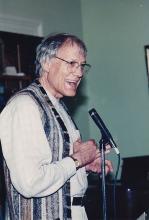Bible Study

AS THE SEAONS after Pentecost unfolds, we might think that summer calls for a kind of “church lite” in which we shouldn’t expect much to happen. With the dramatic commemorations behind us, the scriptures seem miscellaneous. But this season has its own purpose of soaking in the Word. Just let go of dependence on drama.
Our month’s reading opens in 2 Kings 5 with the healing of Naaman, the distinguished Aramean general, told with a dry humor that Jesus appreciated, since he specifically mentions it (Luke 4:27) in his teaching about faith found outside the bounds of Israel. At first Naaman’s dignity is offended by Elisha not bothering even to meet him in person. His pride receives a further blow in the ludicrous banality of the prescription that Elisha’s assistant passes on: “Go, and wash in the Jordan seven times” (verse 10). Naaman’s fuming about the short shrift he got, and the humiliation of being prescribed a business of splashing in a local stream, are quite comic. Paddling in the Jordan indeed—a ditch in comparison to the storied rivers of Damascus! Smiling, we recognize the storyteller’s shrewd knowledge of psychology. The tale has a good ending. Finally getting off his high horse, Naaman allows his aide to persuade him to try the simple bathing routine. Over time his skin is healed and rejuvenated.
The church behaves like that shrewd aide when it invites us to trust in the power of hearing the scriptures again and again, however overfamiliar some of them seem, and others obscure.

THE SAGA OF Elijah that we are following in 1 and 2 Kings culminates in a poignant parting as the prophet prepares to be taken up into heaven. His disciple, Elisha, makes a final all-or-nothing request: “Please let me inherit a double share of your spirit” (2 Kings 2:9). Elijah states a condition for the fulfillment of Elisha’s prayer: “You have asked a hard thing; yet, if you see me as I am being taken from you, it will be granted you; if not, it will not” (2:10). It is as if Elisha has to look unblinkingly into the reality of their separation. If he is to inherit the prophetic mantle and spirit of his teacher, he must claim the vocation in its entirety. He is now to be the prophet.
The story is an uncanny pointer to the truth that John the Evangelist highlights in Jesus’ last words to his disciples: “I tell you the truth: It is to your advantage that I go away, for if I do not go away, the Advocate will not come to you ...” (16:7). John even echoes the “double spirit” theme in 14:12, when he has Jesus assure us that our prophetic endeavors will be more abundant and powerful than Jesus’ own!
The season following Pentecost helps us realize that we are the prophets now, vested with the mandate and endowed with the gifts for enacting the good news of liberation.

“HAVE YOU BEEN born again?” The image of a second birth to illustrate conversion is often used by fundamentalist and conservative evangelical Christians. Yet in my experience such folks also tend to resist thinking of God as other than male. How can they overlook this very maternal activity of God’s Spirit?
Even Nicodemus gets it, at least at the physical level. In John 3, this high-ranking Jewish leader privately approaches Jesus to ask him where his charism comes from. In most familiar translations of the New Testament (such as King James and NIV), Jesus tells Nicodemus that he would understand if he were “born again” (3:3). But the Greek word anōthen is deliberately ambiguous. Jesus’ intended meaning is “born from above” (NRSV). “That which is born of the Spirit is spirit,” says Jesus in verse 6. The Holy One is our birthing mother.
When the literal-minded Nicodemus asks how a person can go back into his mother’s womb and be born again, we cannot be sure (in 3:9-10) whether Jesus gently chides or sarcastically puts him down: “Are you a teacher of Israel, and yet you do not understand these things?”
Sadly, many “teachers” throughout Christian history have not understood these things. It is now 50 years since Betty Friedan’s The Feminine Mystique opened the floodgates of second-wave feminist cultural analysis, thus preparing the ground for biblical scholars and theologians such as Letty Russell, Rosemary Radford Ruether, Elizabeth Schüssler Fiorenza, and many more. Some of us began to see that orthodox, “objective” methods of interpretation were instead often subjectively male-oriented. We began to ask, “Where is the feminine in our sacred texts? Were women there?”
I see five ways in which the gospel of John deconstructs, or at least unsettles, the rigid patterns of patriarchy in the family and society in which Jesus lived. The roles Jesus played during his life and ministry were so atypical that they color this entire narrative.

I WAS BROUGHT UP up on stories of my family's emigration to Russia from England in the 1850s and of the three generations we lived there and intermarried. My grandparents fled the upheavals of revolution in 1917, returning to England. Having drunk deeply from the springs of Russian spirituality, it is second nature to me to hear the scriptures with Russian ears. As Eastertide culminates at Pentecost (rounded out in the wonderful coda of Trinity Sunday), I find myself murmuring as a mantra the great injunction of St. Sergius of Radonezh, "Beholding the unity of Holy Trinity, to overcome the hateful disunity of this world!" The doctrine of the Trinity is no mere antiquity, but a beacon pointing to the future that God desires for the world. In the Trinity, "hateful disunity" can be transformed into life-in-communion; our life together as human beings incarnating our identity as ones made into the image and likeness of God. I will find myself doodling on my notepad the provocative claim of the Russian lay theologian Nikolai Fedorov: "Our social program is the dogma of the Trinity."
Taking in again the Trinitarian grammar of our prayer and faith, I will find myself reinvigorated for the task of forging a spirituality that, as a great Anglican priest Alan Ecclestone wrote, "takes its Trinitarian imagery more seriously than ever before, relating the creativity, the humanizing, and the unification of [humankind] in one growing experience of mutual love." This from a man who was a passionate political activist writing from the thick of gritty urban politics, not from an ivory tower.

HOW SHALL WE engage with scripture through all 50 days of Easter? There are clues in the haunting story of Jesus' appearance beside the sea of Tiberius. After Easter Day many of us are ready to let things quickly revert to normal. It is, strangely, both reassuring and uncomfortable to hear that those disciples, whose business had been fishing, wanted to get back to their boats so promptly after the horrors and wonders they had witnessed in Jerusalem.
Jesus is waiting for them by the shore with breakfast already cooking. All is ready, yet he wants them to bring some of what they haul up in their nets, so he can include samples of their own catch in the menu. And what a catch it was!
Easter is our time to experience the grace that is always ahead of our game and is underway for us before we are ready. Yet grace does not exclude what we bring to the table. Grace expects and includes the work of our hands, the weavings of our imaginations, and the gifts of our unique experiences. In one sense, Eastertide is more truly a season of repentance than is Lent. One thing we might need to repent of is our passivity—those times when we expect God to hand us on a plate the meaning we are hungry for. We need to bring our own bits to the cooking fire if we are to really eat with Jesus. It is part of the mix of grace that we must participate, not just receive.

"THIS IS THE LORD'S DOING; it is marvelous in our eyes. On this day the Lord has acted; we will rejoice in and be glad in it." We will be singing these words from Psalm 118 on Easter Sunday, and they pinpoint a critical issue in our religious witness. Do we have the courage to have God be the subject of sentences, or is God usually the object of our reflections? There is a difference. Do we make ourselves really the subject of our sentences, so that religion is about our doings and ideas and needs? The scriptures insistently talk about what God did and is doing and will do in Christ, the crucified and risen one. Our role is to rejoice in the way God acts upon us, with us, around us, behind us, above us, ahead of us, through us.
Praise is the litmus test. If God is experienced as the one who is acting, the impulse to praise is inevitable. This may help us understand the importance of the psalms in our lectionary. They aren't mere supplementary devotions. As supreme words of praise, they test the authenticity of our reactions to the good news. They test and they can train. The psalter is the church's manual to help practice the "scales of rejoicing," to borrow a phrase from W.H. Auden's "Christmas Oratorio." A phrase on Auden's tombstone comes back to me: "In the prison of his days / Teach the free man how to praise." The psalms come to life only where this teaching is taken seriously.

"EVEN IF I OWNED Picasso's 'Guernica,' I could not hang it on a wall in my house, and although I own a recording of the Solti Chicago Symphony performance of Stravinsky's 'Rite of Spring,' I play it only rarely. One cannot live every day on the boundary of human existence in the world, and yet it is to this boundary that one is constantly brought by the parables of Jesus." So wrote a great New Testament scholar, Norman Perrin, in his book Jesus and the Language of the Kingdom. I often think about his frankness as I prepare for the transition between Epiphany and Lent. We must soften and make bearable the intensity of the scriptural story to face it every week in church. We can't dive to the depths every single week, and we are right to keep our child-friendliness going.
But we need to risk depth and passion, or run the danger of making the gospel seem boring and predictable. Our churchly betrayal of God lies in our willingness to make the Word seem banal. So perhaps the thing we need to give up for Lent is our avoidance of depth. The scriptures this month will speak to us of faith as the experience of being stressed almost to a breaking point. They will plumb the depths of divine frustration and disappointment. We must clear a space for these wounding and thrilling themes and suspend our strategies for making worship palatable and safe.

"NO ONE SPEAKING by the Spirit of God ever says, 'Let Jesus be cursed!'" insists Paul in his first letter to Corinth (12:3). Driving through Corinth not long ago, I found myself musing about the extraordinary spirituality that had grown up in the church he was trying to straighten out. Apparently, ecstatic worshippers caught up in charismatic excitement on the Lord's day were actually known to blurt out these shocking words: "Anathema, Jesus!" In a very brief period, the church there had come up with a mutation of the gospel in which only the cosmic, exalted savior, known through speaking in tongues and exciting miracles, mattered. The earthly person of Jesus of Nazareth had been a mere husk to be shucked off, they said. Only the Spirit-giving celestial Lord mattered. Jesus be damned! His teachings back in Galilee signified nothing; now they could concentrate on the prophecies that came hot and strong from heaven through the church's prophets—a belief that left plenty of room for all sorts of wild ethical "experiments," to put it mildly.
Well, no one actually utters "Let Jesus be cursed" out loud anymore, but, in a more subtle way, how prevalent is a pseudo-spirituality that relativizes the radical teaching of the reign of God! These readings bring us back under the authority of Jesus' witness in Galilee—and the reality that there is no Spirit, and no spirituality, except the one we receive as the driving energy to bring good news to the poor.

“TAKE OFF THE garment of your sorrow and affliction, O Jerusalem, and put on forever the beauty of the glory from God. Put on the robe of the righteousness that comes from God; put on your head the diadem of the glory of the Everlasting” (Baruch 5:1-2). We might occasionally hear in church a prayer that makes passing use of the phrase “the beauty of holiness,” but it can’t be claimed that we are helped very often to feel that the contagious goodness of God is absolutely lovely, alluring, and attractive. We are called to be beautiful human beings. Christians who are deeply serious about social justice, who carry the burden of the world’s brokenness in their hearts, who are committed to political dissent, probably need this reminder most of all. We can hardly be agents of change if our faces are disfigured by disgust and anger.
Advent may be an especially important time to listen carefully for the Word who summons us to be walking sacraments of God’s radiant beauty. Paul will speak to us about having joy in one another and clothing ourselves in love. We are meant to fill our imaginations in these weeks with the sight of Mary in the radiance of her final days of pregnancy. Doesn’t her beauty lend all the more power to her proclamation, “[God my savior] has brought down the powerful from their thrones, and lifted up the lowly; has filled the hungry with good things, and the rich sent away empty” (Luke 1:52-53)?

IT WOULD BE strange if any segment of the liturgical year left out the theme of migration. The Bible is riddled from end to end with the journeys of nomads, pilgrims, exiles, returning exiles, and the risky intrusions of strangers across boundaries erected to deter them.
This season’s poster child for divinely inspired mobility is the lovely figure of the Moabite “alien” Ruth, who chooses to leave her own country and accompany her beloved Jewish mother-in-law when she returns as a widow to her native Judea. Ruth’s story is romantic, even erotic, as she daringly slips into the arms of Boaz during the sexually charged siesta at the threshing floor. But our readings are no mere novelette. Scripture shows how much hinged on her pluck and her allure. Her great-grandson will be David, and her descendant Jesus the Messiah!
“Where would we be without immigrants?” is one of the many questions between the lines of the scriptures. The Bible has lots to say to us about the divine impulse active in migrations, and the opening of the heart to “strangers within our gates”—things guaranteed to alarm defensive nationalists of every stripe.
I remember the deep spiritual emotion that caught us all up in Boston’s Faneuil Hall during my naturalization ceremony—Cambodian refugees, Vietnamese grandmothers, Salvadoran families, and all the rest of us. I think of the migration of my own great-grandparents to Russia, and the adventures that have scattered my own family from New Zealand to Mexico. How God revels in mixing us all up!

Walter Wink, 76, a world-class biblical scholar and non-violent practitioner, crossed over to God on May 10 at his home in Western Massachusetts. Following a slow decline, he had been in hospice for several weeks in the company of his beloved June and their family. (See "Confronting the Powers," Sojourners December 2010)
As a first year seminarian in New York City, more than 35 years ago, I was fortunate to have Walter as my New Testament instructor. In a seminar session on the "pearl of great price" in Matthew, I have a vivid memory of him breaking the discussion so we could go round the circle and each reply to the question: "For what would you be willing to die?" I don't so much recall my own halting answer, as the depth of the question he understood was put to us by the text. It's since become my conviction that no one should escape seminary (or baptismal preparation for that matter) without facing with that query.
Which is to say he was himself an engaged scholar, connecting the academy with the risk of the streets. While filling his first teaching post at Union Seminary in New York he was simultaneously serving on the national steering committee of Clergy and Laity Concerned about the War in Vietnam (1967-76).
He was notorious for foundation-shaking works. When I met him, Walter was a rising star in the biblical guild, on the fast track at Union. Then he published a little polemical book called The Bible in Human Transformation (1973) which made bold to declare, “Historical biblical criticism is bankrupt." It assailed the myth of scientific objectivity, the disembodied approach which kept the text at arms length and pre-empted commitment. In many respects it anticipated the contextualizing hermeneutics of feminist and liberation readings, but it didn't win him friends in the academic guild.

Pope Shenouda led what many would call a biblical and spiritual life — the heartbeat of this ancient church. He loved the Bible, studying it thoroughly, memorizing vast passages, and teaching classes on its content — something unusual in the practices of this liturgical church. After becoming Pope in 1971, for many years he would teach from the Bible on a weekday night (I think it was always Wednesday) in St. Mark’s Cathedral in Cairo. He would schedule his world travels to be back in time for these Bible studies. The cathedral would be packed, and Pope Shenouda would patiently answer the questions raised by those coming to listen and learn.
When I first met Pope Shedouda in 2004, I was general secretary of the Reformed Church in America, leading a denominational delegation to the Middle East. At the close of our “audience” — a time of rich conversation — I presented him with a small travel Bible which had been printed by the RCA. It was the NRSV translation. He took it gracefully, but immediately looked up a particular verse in the New Testament that was of concern, and promptly announced that the NRSV’s translation was inaccurate.
The Bible Society of Egypt, which loved Pope Shenouda’s biblical emphasis, is using the occasion of his funeral this week to reach out to the society. Pope Shenouda’s call to ministry came in 1945, when he read a passage from the Bible in the window of a bookstore of the Bible Society of Egypt. The organization has prepared a pamphlet summarizing his life and love of the Scriptures, and printed 1,000,000 copies for distribution.
Today’s funeral will provide a focus of national attention of the extraordinary life of this church leader.
Seminaries train pastors on how to read the Bible. But those tools often don't reach people in the pews.

Mark's gospel tells us that healing, like suffering, should unite us. A Bible study for the health-care debate.